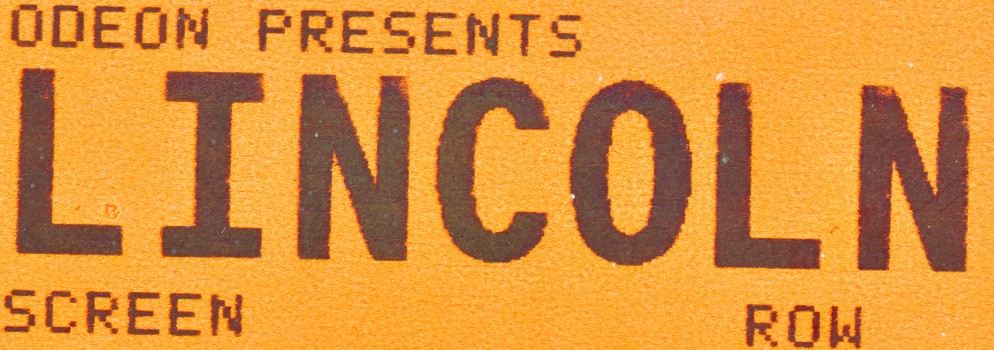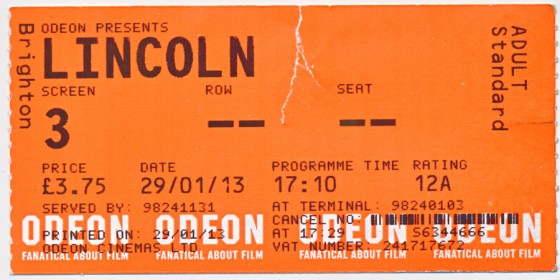Lincoln

The Spectator’s Cut
I don’t have much to say about Lincoln other than being generally surprised that I liked it, given Mr. Spielberg’s track record of late, and furthermore being an Oscar winning film, which I am trained not to like. Trained not so much by whom, but by what: my innate sense of contrariness. Hey, it got me this far.
Wait…where am I?

Besides a lot of meaty period dialog, which I could just eat with a spoon (but use a knife, so you’re not anachronistic), this is a multiple character drama, with all the neat intersections and motives bumping into one another and transforming the story as it unfolds. An especially neat trick, since we know the outcome.
The things that make it weak are the way in which it’s Lincoln. The things that make it strong are the ways in which it’s A Funny Thing Happened on the Way to the Thirteen Amendment.
This is not a movie about Lincoln, which would have been deathly dull, like all biopics are. And in the realm of I told you so, let me say that this falls under the When We Were Kings Rule. It doesn’t tell the whole person’s life; it’s a very narrow period, with very defined goals, which tells us more about the person (and it does) than the sprawling history, replete with He Was Nice Because His Mother Was Nice, or, with absolutely no awareness of the possibility of the contradiction, He Was Nice Because His Mother Was Mean. Explaining characters helps me understand…that psychology is good way to slow the story down.
Lincoln, it’s the better version of Django Unchained, not because it’s the serious movie about slavery. In fact, Lincoln is the comedy version of Django, and that’s as offensive as a complement can be, just as it’s as complementary as an offense. That doesn’t actually mean anything, but there was no way I wasn’t going to invert that sentence. As with Django Unchained, the things that make it weak are the way in which it’s Lincoln and the things that make it strong are the ways in which it’s A Funny Thing Happened on the Way to the Thirteen Amendment. The film works when it’s about many characters, and fails when it’s about one. Its success is therefore about proportion, there’s just more Spader’s and Jones’ and Goggin’s flailing about, trying to bribe, cajole, avoid, perjure, shoot, threaten and run away in fast motion chased by big breasted women. The failure in the film lies when it sees Lincoln as the central character, which is fair enough, since Lincoln Freed The Slaves!
(cough)
And gliding over the glaring historical whitewashing (literally, see the first syllable of that word) here, let’s just agree that such focus grinds down the film. What the film depicts so well is the mess, the fun mess, of politics. Lincoln can be a main character, but when he’s your lead, besides screwing up the procedure of events, you get bits that we could have done without. Most achingly this culminates, well, not literally, since technically we’re watching a film, uh, visually, but then it is at the end, so it is a literal culmination, so metonymically?, where we see the hagiographic image of Lincoln after he’s shot, a floating cameo that would have made DW Griffith blush. He’s a saint! You know, the whole point the movie was trying to avoid.

Look, I saw it because it’s my Mom’s favorite film, and she never sees movies, and thank God I liked it. Or I’d have to lie, and you know how much energy that takes up.
And so to the spectator’s cut, which I use for so many films. Most of the time, it’s cutting out everything but one ridiculous Al Pacino cameo, or the last ten seconds, or erasing the part where I bought the ticket. But in the case of Lincoln it’s the first five and the last ten minutes. I leave out the war stuff, largely because it’s so fucking inaccurate, and then I end it, which actually works in keeping with every theme of the film, with Mr. Tommy Lee Jones and Ms. S. Epatha Merkerson in bed. All the problematic ethics and self-serving behavior put to the side, abolishing slavery was about compassion; otherwise what would be the point? This is a movie about love, goddammit, and this is the metonym that does it. Hah, I got to use that word incorrectly twice, but I just love the sound of it. I just wished it meant what I wanted it to, which is the encapsulation of the themes of a work of art in an event congruent to the narrative direction of the story. No such word, really, unless you count Pudovkinism.
I have got to learn German. Or stop making reference to esoteric Russian film directors.
Stopping it here makes it a near perfect film, and the goodness, and choices and intersections and fucking dialog that proceeded the crappy ending, which after all I did have to actually sit through, make up for this. It is this cut of the film that getting the Leonard award. And when you buy the DVD and look for the Scott King Cut on the menu, and you’ll see how seriously Hollywood takes me.
$13.50
The Lonely Comments Section

 [logo]
[logo]
